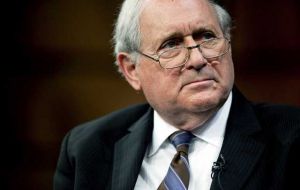MercoPress. South Atlantic News Agency
US Senate grills banks accused of 'unfair' trading practices with commoditisers
 “If you like what Wall Street did for the housing market, you'll love what Wall Street is doing for commodities”, said Senator Carl Levin
“If you like what Wall Street did for the housing market, you'll love what Wall Street is doing for commodities”, said Senator Carl Levin  The report alleges that 'merry-go-round' deals led to a surge in the price of aluminum, helping Goldman's bottom line while potentially hurting consumers.
The report alleges that 'merry-go-round' deals led to a surge in the price of aluminum, helping Goldman's bottom line while potentially hurting consumers. Executives of three US banks are being grilled by senators over accusations the banks engaged in unfair trading practices relating to several commodities. A two-year report found that Goldman Sachs, Morgan Stanley and JP Morgan Chase bought up large stockpiles of commodities like aluminum and copper.
In doing so, they were able to influence prices and gain advantages. The banks deny they exploited any trading advantages from these holdings. But the report said the scale of their commodities stakes put the US financial system at risk.
Furthermore, the report alleges that the banks violated US law in exceeding the limits on the amount of commodities they were allowed to hold. All of the banks identified in the report say they have now reduced their holdings in commodities and have adequate procedures in place to manage the riskiness of these assets.
During the second day of the hearing Daniel Tarullo, a member of the Federal Reserve's Board of Governors, was scheduled to answer questions about whether the Fed was providing enough regulatory oversight of the banks with regard to their commodities desks.
In his opening remarks, US Senator Carl Levin, a Democrat from Michigan and the chair of the committee that investigated the banks, said: “If you like what Wall Street did for the housing market, you'll love what Wall Street is doing for commodities.”
The hearing will also address whether banks' risk procedures accurately took into account the potential cost to the bank of a disaster, for example if a natural gas refinery that the bank had purchased were to explode.
The Senate report referred to a 2012 study conducted by the Fed which found that the banks did not have enough capital and insurance coverage should a catastrophe strike in their commodities businesses.
For instance, if each bank were to suffer a disaster on the scale of BP's 2010 oil spill in the Gulf of Mexico, they would not have enough funds to cover the losses.
The Fed wrote: “catastrophes involving environmentally sensitive commodities may cause fatalities and economic damages well in excess of the market value of the commodities involved or the committed capital and insurance policies of market participants”.
Furthermore, the banks will face scrutiny over how their large positions in certain commodities - such as Goldman Sachs' large stake in the aluminum market - could lead to unfair trading advantages that could in turn result in the cost of those goods being driven up for consumers.
The report discusses so-called “merry-go-round” deals in which Metro International Trade Services, an aluminum warehouse operator purchased by Goldman Sachs, gave incentives to some firms to keep their aluminum supplies in Metro's Detroit warehouses.
Essentially, those firms would agree to have their metal loaded out of the warehouses and then back in, in an effort to force other aluminum owners to wait longer to store their supplies and thus pay more.
The Senate report alleges this led to a surge in the price of aluminum, helping Goldman's bottom line while potentially hurting consumers.
Furthermore, by both operating an aluminum warehouse supplier and trading in the purchase of aluminum, the Senate report accuses Goldman of gaining an unfair trading advantage by potentially acting on inside information about the industry.
Goldman has strenuously denied the accusations.
In prepared remarks, Jacques Gabillion, Goldman's head of global commodities investments, said: “Regular reviews by Goldman Sachs personnel have not found a single instance where confidential Metro information went to the metals-trading personnel of Goldman Sachs.”
He added that the bank did not seek to increase wait times at Metro's warehouses and that its conduct had “no impact” on the price of aluminum.




Top Comments
Disclaimer & comment rules-

Read all commentsCrooks always find “ways” around what they see as restrictive conditions and the banks are among the biggest crooks in the world.
Nov 22nd, 2014 - 07:09 pm 0It will be really interesting to see what, if anything, the Fed will do.
Anybody want to bet they STOP the banks over-stretching themselves yet again?
Ha, ha, ha. Fool me once, shame on you; fool me twice, shame on me jumps to mind.
Commenting for this story is now closed.
If you have a Facebook account, become a fan and comment on our Facebook Page!